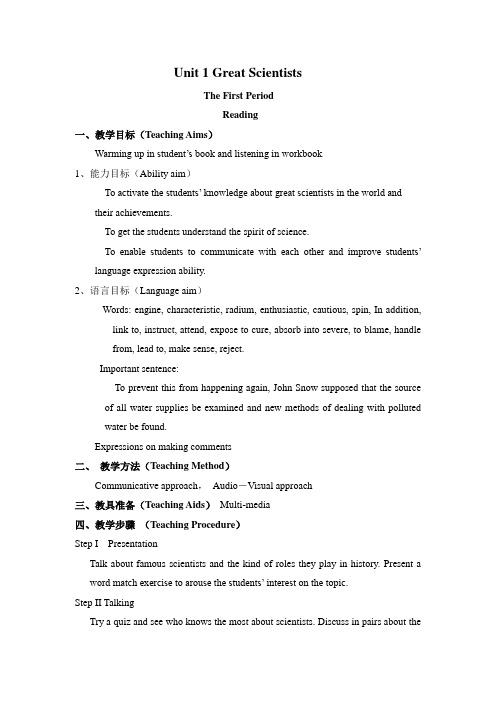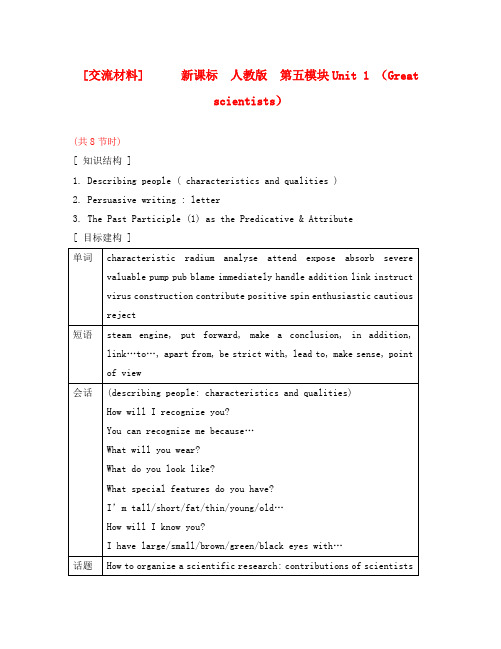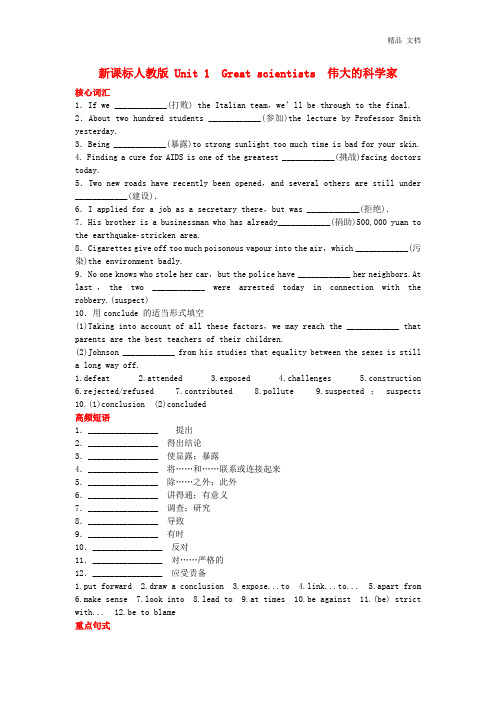人教新课标必修五 Unit 1 Great scientists-learning about language[课件]
- 格式:ppt
- 大小:306.00 KB
- 文档页数:18

Unit 1 Great ScientistsThe First PeriodReading一、教学目标(Teaching Aims)Warming up in student’s book and listening in workbook1、能力目标(Ability aim)To activate the students’ knowledge about great scientists in the world andtheir achievements.To get the students understand the spirit of science.To enable students to communicate with each other and improve students’ language expression ability.2、语言目标(Language aim)Words: engine, characteristic, radium, enthusiastic, cautious, spin, In addition,link to, instruct, attend, expose to cure, absorb into severe, to blame, handlefrom, lead to, make sense, reject.Important sentence:To prevent this from happening again, John Snow supposed that the source of all water supplies be examined and new methods of dealing with polluted water be found.Expressions on making comments二、教学方法(Teaching Method)Communicative approach,Audio-Visual approach三、教具准备(Teaching Aids)Multi-media四、教学步骤(Teaching Procedure)Step I PresentationTalk about famous scientists and the kind of roles they play in history. Present a word match exercise to arouse the students’ interest on the topic.Step II TalkingTry a quiz and see who knows the most about scientists. Discuss in pairs about thesignificance of some achievements.Step III Group WorkDiscuss in groups about the basic factors that make a scientist successful. Homework1.Oral homework: Prepare a story about a famous scientist and share the story withthe whole class.2.Written homework: Write down the story and make comments on the key tosuccess.。

人教版英语必修五 Unit 1 Great scientists重难点【重点】(1)了解著名医生John Snow、钱学森、哥白尼等科学家以及他们的作为和故事。
(2)学习表示意愿、希望和建议的句型。
(3)学习过去分词作定语和表语的结构。
(4)学习写好“persuasive writing”,以训练学生的逻辑思维及写作能力.一、重点单词1、characteristic n. 特征,特性2、expose vt. 暴露,揭发,曝光(摄影)3、defeat vt. & n. 击败;战胜;4、cure vt. & n. 治愈,治疗法5、blame vt. 责备,归咎6、backward adj. & adv. 向后7、conclude vt. & vi. 结束,总结二、重要词组句型1、in addition 此外2、apart from除……以外(except for);除……外,还有(besides)3、be strict with sb. 对某人严格4、lead to 导致,通向(to 为介词)5、link…to… 将……和……连接起来6、keep sb /sth +doing /done /adj. 让某人或事物做……三、课文长句难句1、In addition, he found two other deaths in another part of London that were linked to the Broad Street outbreak.2、To prevent this from happening again, John Snow suggested that the source of all water supplies be examined and new methods of dealing with polluted water be found. 2四、语法知识——过去分词的用法【词汇积累】1. put forward 提出2. draw a conclusion 得出结论3. be/get under control 在……控制下be/get out of control 失去控制,不能操纵4. be absorbed in 专心5. be to blame 应该受责备(用主动形式表示被动)blame sb. for sth. 因某事责备某人6. in addition 也,另外,此外7. link...to... 将…和…连接或联系起来8. die of 因…而死亡(内因)die from 因…而死亡(外因)9. lead to 导致,通向10. make sense 有意义,说得通11. apart from 除…之外,此外12. contribute to 为…作贡献或捐款,导致,有助于13. be enthusiastic about 对…热情14. be curious about 对…好奇15. cure sb. of illness 治好某人…病16. point of view 态度,观点,看法17.(be)strict with sb. 对某人要求严格【重点单词用法精解】1. characteristic n. 特征,特性The chief characteristic of human being is that they can think. 人类主要的特征是他们会思考。

哥白尼与日心说尼古拉.哥白尼(Copernicus Nicholas),波兰一位伟大的天文学家。
他以惊人的天才和勇气揭开了宇宙的秘密,奠定了近代天文学的基础。
哥白尼以毕生的精力去进行天文研究,创立了《天体运行论》这一“自然科学的独立宣言”。
他的这些成就使他成为了人类科学发展历史上最伟大的革命家之一。
一. 哥白尼生平哥白尼于1473年2月19日出生在波兰西部维斯杜拉河畔托伦城的一个商人家庭。
家里兄妹四个,哥白尼是最小的。
在他10岁时,父亲去世了,舅父卢卡斯承担起了抚育他的重任。
1491年至1495年,哥白尼进入克拉科夫大学学习。
克拉科夫是当时波兰的首都,也是东欧最大的贸易和文化中心,有许多国家的留学生在这里学习。
由于它地处东西欧交通要冲,所以比较早地受到意大利文艺复兴的影响。
因此在这座古老的大学里,新兴的资产阶级人文主义思想和腐朽的封建教会的经院哲学之间展开了激烈的斗争。
哥白尼在先进的人文主义思想的熏陶下,在心灵里埋下了向经院哲学挑战的种子。
在这里,他遇到了对他的一生产生深远影响的数学家和天文学家布鲁楚斯基(Brudzewski)教授。
是这位教授的启蒙教育促使哥白尼决定将自己的一生奉献给天文科学。
1496年哥白尼前往意大利求学,先后进入博洛尼亚大学、帕多瓦大学和费拉拉大学学习和研究法律、天文学、数学、神学和医学,他同时还学会了希腊文。
1503年,哥白尼获得了教会法规博士学位。
1497年,哥白尼就任瓦尔半米亚牧师的僧正。
1510年后,他先后从事过管理、外交等工作。
他是一个杰出的经济学家,写过《货币的一般理论》一书。
他是近代第一个提出劣币淘汰良币理论的经济学家。
哥白尼医术高明,他利用业余时间行医,免费为穷苦人治病,是一位颇有名望的医生,被人们誉为“神医”。
哥白尼还是一位出色的数学家,他的巨著《天体运行论》附录里,发表过他的球面三角论文。
哥白尼也是一位伟大的爱国主义者,当条顿骑士团疯狂侵略波兰时,他挺身而出,起来保卫自己的祖国。

[交流材料] 新课标人教版第五模块Unit 1 (Greatscientists)(共8节时)[ 知识结构 ]1.Describing people ( characteristics and qualities )2.Persuasive writing : letter3.The Past Participle (1) as the Predicative & Attribute[ 目标建构 ]The First Period( Warming up & Pre-reading )Teaching procedures & ways:Step 1 Lead-in1. Can you name some famous scientists?2. In your opinion, what qualities should a scientist have?(Common characteristics: bright/ brightness; creative; cautious; persuasive; strict; positive; co-operative; enthusiastic; etc.)3. What kind of scientists do you know?(geologist; geographer; mathematician; physicist; chemist; agriculturist; astronomer; botanist; biologist; inventor …)Step 2 Warming up1. Page 1, SB. Ask Ss to finish the quiz and find out who knows most.2. Show some pictures of these great scientists and have a brief introduction to them.Step 3 Pre-reading (Discussion)1. What do you know about infectious diseases? What kind of infectious diseases do you know?(Infectious diseases can be spread easily, they have unknown cause and may do great harm to people. SARS; Bird flu; AIDS; etc.)2. What do you know about cholera? (T can introduce this disease by using slides)3. Do you know how to prove a new idea in scientific research? Discuss in small groups the stages in examining a new scientific idea. What order would you put them in?(Find a problem→Make up a question→Think of a method→Collect results→Analyse the results→Repeat if necessary→Draw a conclusion) Step 4 Language points(一)、重点单词解析1. discover vt. to be the first to find, learn of, or observe 发现,发觉discover 通常指被探索或被揭示物早就客观存在着;invent指的是发明原先不存在的东西。

新课标人教版 Unit 1 Great scientists 伟大的科学家核心词汇1.If we ____________(打败) the Italian team,we’ll be through to the final. 2.About two hundred students ____________(参加)the lecture by Professor Smith yesterday.3.Being ____________(暴露)to strong sunlight too much time is bad for your skin.4. Finding a cure for AIDS is one of the greatest ____________(挑战)facing doctors today.5.Two new roads have recently been opened,and several others are still under ____________(建设).6.I applied for a job as a secretary there,but was ____________(拒绝).7.His brother is a businessman who has already____________(捐助)500,000 yuan to the earthquak estricken area.8.Cigarettes give off too much poisonous vapour into the air,which ____________(污染)the environment badly.9.No one knows who stole her car,but the police have ____________ her neighbors.At last,the two ____________ were arrested today in connection with the robbery.(suspect)10.用conclude 的适当形式填空(1)Taking into account of all these factors,we may reach the ____________ that parents are the best teachers of their children.(2)Johnson ____________ from his studies that equality between the sexes is stilla long way off.1.defeat2.attended3.exposed4.challenges5.construction6.rejected/refused7.contributed8.pollute9.suspected;suspects 10.(1)conclusion (2)concluded高频短语1.________________ 提出2.________________ 得出结论3.________________ 使显露;暴露4.________________ 将……和……联系或连接起来5.________________ 除……之外;此外6.________________ 讲得通;有意义7.________________ 调查;研究8.________________ 导致9.________________ 有时10.________________ 反对11.________________ 对……严格的12.________________ 应受责备1.put forward2.draw a conclusion3.expose...to4.link...to...5.apart from6.make sense7.look into8.lead to9.at times 10.be against 11.(be) strict with... 12.be to blame重点句式1.____________its cause ____________ its cure was understood.人们不知道它的病源,也不了解它的治疗方法。

Unit 1 Great scientists 教案1(JOHN SNOW DEFEATS “KING CHOLEAR”<PART 1>)Teaching Goals1. Enable the Ss to familiar with some famous scientists and their contributions.2. Enable the Ss to learn how to organize a scientific research.3. Let the Ss learn the reading skill of getting the main idea of each para./ part & each passage.Difficult points1. How to grasp the main idea of each paragraph / part & each passage.2. How to help the Ss use what they’ve learnt to do first aid treatment for burns correctly.Teaching methods1. Skimming & scanning methods to make the Ss get a good understanding of the text.2. Discussion methods to make the Ss understand what they’ve learned in class.3. Pair work of group to get every student to take part in the teaching-and-learning activities.4. Competition and role-play method to arouse the Ss’ interest.Teaching processI. Warming upStep I Lead inTalk about scientist.T: Hi, morning, class. Nice to see you on this special day, the day when you become a senior two grader. I am happy to be with you helping you with your English. Today we are to read about a certain scientist. But first let’s define the word “scientist”. What is a scientist?A scientist is a person who works in science, trying to understand how the universe or other things work.Scientists can work in different areas of science. Here are some examples: Those that study physics are physicists. Those that study chemistry are chemists. Those that study biology are biologists.Step IIAsk the students to try the quiz and find out who knows the most.T: There are some great scientific achievements that have changed the world. Can you name some of them? What kind of role do they play in the field of science? Do these achievements have anything in common? Match the inventions with their inventors below before you answer all these questions.1. Archimedes, Ancient Greek (287-212 BC), a mathematician.2. Charles Darwin, Britain (1808-1882). The name of the book is Origin of Species.3. Thomas Newcomen, British (1663-1729), an inventor of steam engine.4. Gregor Mendel, Czech, a botanist and geneticist.5. Marie Curie, Polish and French, a chemist and physicist.6. Thomas Edison, American, an inventor.7. Leonardo da Vinci, Italian, an artist.8. Sir Humphry Davy, British, an inventor and chemist.9. Zhang Heng, ancient China, an inventor.10. Stepper Hawking, British, a physicist.II. Pre-readingGet the students to discuss the questions on page 1 with their partners. Then ask the students to report their work. Encourage the students to express their different opinions.1. What do you know about infectious diseases?Infectious diseases can be spread to other people. They have an unknown cause and need public health care to solve them. People may be exposed to infectious disease, so many animals, such as bird flu, AIDS, SARS are infectious diseases. Infectious diseases are difficult to cure.2. What do you know about cholera?Cholera is the illness caused by a bacterium called Vibrio cholerae. It infects people’s intestines(肠), causing diarrhea and leg cramps(抽筋).The most common cause of cholera is by someone eating food or drinking water that has been contaminated(污染)with the bacteria.Cholera can be mild(不严重的)or even without immediate symptoms(症状), but a severe case can lead to death without immediately treatment.3. Do you know how to prove a new idea in scientific research?Anybody might come out with a new idea. But how do we prove it in scientific research? There are seven stages in examining a new idea in scientific research. And they can be put in the following order. What order would you put the seven in? Just guess.Find a problem→ Make up a question→ Think of a method→ Collect results→Analyze the results→ Draw a conclusion→ Repeat if necessaryIII. ReadingStep I SkimmingRead the passage and answer the questions.1. Who defeats “King Cholera”? (John Snow)2. What happened in 1854? (Cholera outbreak hit London.)3. How many people died in 10 days? (500)4. Why is there no death at No. 20 and 21 Broad Street as well as at No. 8 and 9 Cambridge Street?(These families had not drunk the water from the Broad Street pump.)Skim the passage and find the information to complete the form below.Who When What How ResultJohn Snow 1854 helping ordinary people exposed to cholera Examining the source of all water supplies and finding new methods of dealing with polluted water “King Cholera”defeatedStep II ScanningRead the passage and number these events in the order that they happened.2 John Snow began to test two theories.1 An outbreak of cholera hit London in 1854.4 John Snow marked the deaths on a map.7 He announced that the water carried the disease.3 John Snow investigated two streets where the outbreak was very severe.8 King Cholera was defeated.5 He found that most of the deaths were near a water pump.6 He had the handle removed from the water pump.Step III Main idea and correct stageRead the passage and put the correct stages into the reading about research into a disease. John Snow Defeats “King Cholera”Paragraph Stages General ideas1. Find a problem:What cause the cholera? The causes of cholera2. Make up a question:Which is right? The correct or possible theory3. Think of a method:Test two theory Collect data on where people were ill and died and where they got their water4. Collect results:Mark the death Plot information on a map to find out where people died or did not die 5. Analyze the results:Find the resource of the water Look into the water to see if that is the cause of the illness6. Find supporting evidence Find other evidences to confirm his conclusion7. Draw a conclusion The polluted dirty source of drinking water was to blame for the cause of the London choleraStep IV Group discussionAnswer the questions (Finish exercise 2 on Page 3)1. John Snow believed Idea 2 was right. How did he finally prove it?(John Snow finally proved his idea because he found an outbreak that was clearly related to cholera, collected information and was able to tie cases outside the area to the polluted water.)2. Do you think John Snow would have solved this problem without the map?(No. The map helped John Snow organize his ideas. He was able to identify those households that had many deaths and check their water-drinking habits. He identifiedthose houses that had no deaths and surveyed their drinking habits. The evidence clearly pointed to the polluted water being the cause.)3. Cholera is a 19th century disease. What disease do you think is similar to cholera today?(Two diseases, which are similar today, are SARS and AIDS because they are both serious, have an unknown cause and need public health care to solve them.)Step V Using the stages for scientific research and write a summary.Sept VI Word Study1. (Pair work) Get Ss to learn the new words and phrases on p92 within 3 mins, by reading them aloud to each other to make sure that they can pronounce the words correctly----Get Ss to read aloud the words in pairs by turns, e.g. 1 pairs read 4 words then go to next pair2. Practice Use the correct form of the words to fill in the blanks.Step VII. Homework1. Finish P4, Ex 1,2(on SB) Ex3 make sentences on exercise book (make one’s way to, make up one’s mind, make sure, make room for)2. Find out the phrases according to the Chinese (part 1 on the paper for language points)3. Retell the story John Snow Defeats “King Cholera” by following the 7 steps on p14. Read notes to Unit 1, p78-79, find out some difficult points while reading the text品味人生1、不管鸟的翅膀多么完美,如果不凭借空气,鸟就永远飞不到高空。
必修五 Unit 1 Great ScientistsPeriod 5 GrammarTeaching Aims:1. Get the hang of past participle used as attributive and predicative.2. Know the difference between V-ing form and the past participle used as the attribute and predicative.Teaching Important Points:1. Enable the students to use the Past Participle as the Attribute & Predicative in real situations.Teaching difficult points1.Have the Ss sum up the function of the past participle2.Know the difference between V-ing form and the past participle used as theattribute and predicative.Teaching Methods:1.Inductive , comparison, explanation and exercise method2.cooperative workTeaching ProceduresStep 1 RevisionCheck the homework.Step 2 Grammar LearningPart 1 Competition.Divide the class into four teams. Each team chooses one student as their leader. The leader will choose the amount of money which stands for each question and can choose any one in the team to answer the question. If the answer is correct, the group will get the amount money. If not, they will lose the money.1. What do you know about Dr. John Snow’s being well-known in London?He attended Queen Victoria to ease the birth of her babies.2. From what disease did Londoners suffer in his age and why did he get inspired? They exposed themselves to cholera. He got inspired when he thought about helping ordinary people exposed to cholera.Ordinary people who were exposed to cholera3.Why did so many terrified people die every time there was an outbreak?Neither its cause, nor its cure was understood4. When did Dr. Snow think the disease would be controlled?He knew it would never be controlled until its cause was found.5. What was the second theory explaining how the disease killed people?People absorbed this disease into their bodies with their meals. From the stomach the disease attacked the body quickly and soon the affected person was dead.6. Where did the water of pump from and how did it get polluted?It came from the river, which had been polluted by the dirty water from London7. What did Dr. Snow advised the people in Broad Street do?He told the astonished people in Broad Street to remove the handle from the water pump so it could not be used8.What else did Dr. Snow find in another part of London that were linked to the Broad Street outbreak?In addition, he found 2 other deaths.9. What conclusion did Dr. Snow tell the public?He announced that polluted water carried the disease.10.To prevent the cholera from spreading again, what did John Snow do?He suggested that the source of all water supplies be examined and that new methods of dealing with polluted water be found. The water companies werealso instructed not to expose people to the polluted water anymore.11. Why were these families working in the pub at 7 Cambridge Street not affected ? Because they were given free beer and so had not drunk the water from the Broad Street pump.Now please look at these phrases esp. the words in red. What’s the same characteristic of these words? That’s wha t we will talk about today---the past participlePart 2 The past participle used as the attribute and predicative过去分词的句法功能:1.过去分词作定语(Attribute)1) 在句中的位置单个的过去分词作定语时,位于它所修饰的名词或代词前面;过去分词短语作定语时,位于它所修饰的名词或代词后面。
人教版高中英语必修五第一单元重点句子Unit1Greatscientists人教版高中英语必修五第一单元重点句子Unit 1 Great scientistsI. Phrases1. put forward 提出2. draw a conclusion 得出结论3. be/get under control 在……控制下be/get out of control失去控制,不能操纵4. be absorbed in 专心5. be to blame 应该受责备(用主动形式表示被动)blame sb. for sth. 因某事责备某人6. in addition 也,另外,此外7. link.。
to.。
将…和…连接或联系起来8. die of 因…而死亡(内因)die from 因…而死亡(外因)9. lead to 导致,通向10. make sense 有意义,说得通11. apart from 除…之外,此外12. contribute to 为…作贡献或捐款,导致,有助于13. be enthusiastic about 对…热情14. be curious about 对…好奇15. cure sb. of illness 治好某人…病16. point of view 态度,观点,看法17.(be)strict with sb. 对某人要求严格II. Sentences1. John Snow was a well-known doctor in London –so famous,indeed,that he attended Queen Victoria to ease the birth of her babies.约翰?斯诺曾经是伦敦一位著名的医生――他的确太负盛名了,所以维多利亚女皇生孩子时都是他去照料,帮助她顺利分娩。
2. But he became inspired when he thought about helping ordinary people exposed to cholera.但当他一想到要帮助患病的普通老百姓,特别是那些得了霍乱的患者时,他就感到很振奋。
必修五U1 Great Scientist 重点词汇、短语&句型形象记忆[动]construct建造↔[动]destroy破坏[名]construction建造↔[名]destruction破坏形象记忆Many people contributed money to the poor boy, which contributed to his returning to school. A writer wrote a story about this and contributed it to a newspaper.许多人给那个可怜的男孩捐款,使他可以重返校园。
一位作家写了一则关于此事的故事并把它投到一家报社。
形象记忆5. He placed a fixed sun at the centre of the solar system with_the_planets_going_round_it and only the moon still going round the earth.他把固定的太阳放在太阳系的中心,别的行星都围绕太阳转动,只有月亮仍然围绕地球转动。
with the planets going round it 是“with +宾语+宾语补足语”结构,在句中作状语,表示原因、条件、伴随等。
此外,此结构还可作后置定语。
with 复合结构的构成:with +宾语+⎩⎪⎨⎪⎧ adj ./adv ./介词短语宾语和宾补之间是主动关系宾语和宾补之间是被动关系不定式作宾补有“将来”的含义①The little boy ran along the street with nothing on. 这个小男孩沿街跑着,什么也没穿。
②With prices going_up,_we can't afford too many clothes. 随着物价的上涨,我们买不起太多的衣服。